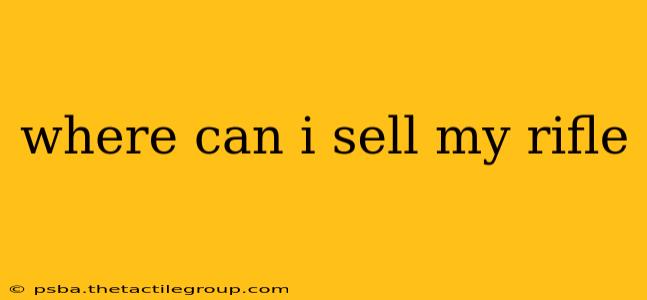Where Can I Sell My Rifle? A Guide to Safe and Legal Firearm Sales
Selling a rifle requires careful consideration of legal regulations and safety practices. This guide outlines various avenues for selling your firearm, emphasizing responsible and secure transactions. Always prioritize safety and compliance with local, state, and federal laws. Regulations vary significantly by location, so understanding your specific jurisdiction's rules is paramount.
Understanding the Legal Landscape
Before exploring sales options, familiarize yourself with the legal requirements in your area. These may include:
- Background checks: Many states mandate background checks for all firearm sales, even private ones. Ignoring these laws can lead to serious legal consequences.
- Licensing: You may need a license to sell firearms, depending on your location and the volume of sales.
- Registration: Some jurisdictions require firearms to be registered, impacting both the sale and the buyer's responsibilities.
- Prohibited firearms: Certain types of firearms may be restricted or prohibited entirely, impacting their sale.
Consult your state's attorney general's office or a qualified firearms attorney to understand the specifics of your local laws. This is crucial to ensure a legal and safe transaction.
Options for Selling Your Rifle
Several options exist for selling your rifle, each with its own advantages and disadvantages:
1. Licensed Firearms Dealers:
- Pros: These dealers handle all the legal paperwork and background checks, simplifying the process and minimizing your legal risk. They also offer a secure environment for the transaction.
- Cons: Dealers typically offer lower prices than private sales due to their overhead and profit margins.
2. Online Gun Auction Sites:
- Pros: Can reach a broader audience of potential buyers. Some sites incorporate escrow services to enhance security.
- Cons: Requires careful screening of buyers and adherence to platform rules and regulations. Risks associated with online transactions, including scams and fraudulent buyers, are present.
3. Private Sales:
- Pros: Potentially higher selling price compared to dealer sales.
- Cons: Carries significant legal and safety risks if not conducted properly. Requires meticulous attention to background checks and safe transfer procedures. Increased vulnerability to scams.
4. Gun Shows:
- Pros: Can provide access to a large pool of potential buyers.
- Cons: Similar to private sales, careful attention to legal requirements and safe handling practices is critical. Background check laws may still apply.
Safe Practices for Selling Your Rifle
Regardless of the chosen method, prioritizing safety is paramount:
- Thorough Background Check: Always conduct a thorough background check on any potential buyer, adhering to all relevant laws.
- Secure Transfer: Choose a public, well-lit location for the transaction, preferably with a witness present.
- Proper Documentation: Maintain detailed records of the sale, including the buyer's information, date, location, and firearm details.
- Safe Handling: Handle the firearm responsibly throughout the entire process, always keeping it unloaded and pointed in a safe direction.
Selling a rifle involves legal and safety considerations. Understanding your local laws, choosing a reputable sales method, and practicing safe handling are crucial for a successful and responsible transaction. Remember, consulting with legal counsel or a firearms expert is highly recommended before proceeding.

